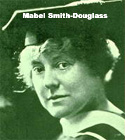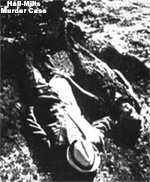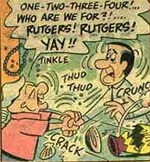

 In 1830, Colonel Rutgers, the namesake of Rutgers College, died without leaving a penny to the institution.
In 1830, Colonel Rutgers, the namesake of Rutgers College, died without leaving a penny to the institution.
 In 1874, a whale was beached on the banks of the old Raritan. It's skeleton was later hung from the ceiling of the geological hall.
In 1874, a whale was beached on the banks of the old Raritan. It's skeleton was later hung from the ceiling of the geological hall.
 In 1879, Mark Twain accepted his invitation to become a member of the Rutgers Philoclean Society, but failed to make the monetary contribution.
In 1879, Mark Twain accepted his invitation to become a member of the Rutgers Philoclean Society, but failed to make the monetary contribution.
 In 1898, accused by his grandfather of "pay(ing) too close attention to some young girls whose acquaintance he could not afford to cultivate intimately" and unable to convince his family of his innocence, 21-year-old student Henry Janeway Weston shoots himself dead in his room.
In 1898, accused by his grandfather of "pay(ing) too close attention to some young girls whose acquaintance he could not afford to cultivate intimately" and unable to convince his family of his innocence, 21-year-old student Henry Janeway Weston shoots himself dead in his room.

 In 1933, Mabel Smith Douglass, whom Douglass College was named for, retired to her cottage in Lake Placid. She took her boat out for her daily row on the lake but did not return. Her empty boat was found later in the afternoon, but the mystery ensued, as searchers turned up no trace of her. Thirty years later, her body was found at the bottom of the lake, with another unsolved mystery still remaining - if the cause was suicide or accidental.
In 1933, Mabel Smith Douglass, whom Douglass College was named for, retired to her cottage in Lake Placid. She took her boat out for her daily row on the lake but did not return. Her empty boat was found later in the afternoon, but the mystery ensued, as searchers turned up no trace of her. Thirty years later, her body was found at the bottom of the lake, with another unsolved mystery still remaining - if the cause was suicide or accidental.
 23 Nichol Avenue currently serves as the residence for the Dean of Douglass College, and in 1922, was the residence of the Reverend Edward Hall. Hall was so popular that people were willing to excuse him of his one crime - a passionate love affair with the local choir singer, Eleanor Mills. They did not keep their love secret; in fact, they were often seen walking together arm in arm. In an ironic twist, they were also discovered murdered together, arm in arm. According to Justice Junction, "The couple was laid out, each body looked almost as it should have if they were alive, except for the deadly wounds.
23 Nichol Avenue currently serves as the residence for the Dean of Douglass College, and in 1922, was the residence of the Reverend Edward Hall. Hall was so popular that people were willing to excuse him of his one crime - a passionate love affair with the local choir singer, Eleanor Mills. They did not keep their love secret; in fact, they were often seen walking together arm in arm. In an ironic twist, they were also discovered murdered together, arm in arm. According to Justice Junction, "The couple was laid out, each body looked almost as it should have if they were alive, except for the deadly wounds.  Shredded paper lay around and in between the couple, which would later be identified as love letters and cards sent between the two. There was a small card that had been propped up against the dead man's foot, the business card of Reverend Edward W. Hall, pastor of the Episcopal Church of St. John the Evangelist in New Brunswick. The inspecting officer also found a man's wallet lying open on the ground, containing the driver's license of one Edward Wheeler Hall, 41, of 23 Nichols Avenue in New Brunswick. The woman had no identification. Officer Curran stopped a passing motorist and inquired as to whether or not he knew the Reverend. The motorist did indeed and verified that the dead man was the Reverend". To this day, the crime remains unsolved. Many believed the weapon was hidden, and due to reconstruction, buried in the walls of the residence. The mistress in the case of "The Minister and the Choir Singer", Mills is buried at the Van Liew Cemetery in New Brunswick.
Shredded paper lay around and in between the couple, which would later be identified as love letters and cards sent between the two. There was a small card that had been propped up against the dead man's foot, the business card of Reverend Edward W. Hall, pastor of the Episcopal Church of St. John the Evangelist in New Brunswick. The inspecting officer also found a man's wallet lying open on the ground, containing the driver's license of one Edward Wheeler Hall, 41, of 23 Nichols Avenue in New Brunswick. The woman had no identification. Officer Curran stopped a passing motorist and inquired as to whether or not he knew the Reverend. The motorist did indeed and verified that the dead man was the Reverend". To this day, the crime remains unsolved. Many believed the weapon was hidden, and due to reconstruction, buried in the walls of the residence. The mistress in the case of "The Minister and the Choir Singer", Mills is buried at the Van Liew Cemetery in New Brunswick.
 In New Brunswick, there is a site called Probasco's Mill, the remains of which can still be seen where its stream flows into the Raritan River. Across from this site, Alexander Hamilton fought off the British at Raritan Landing.
In New Brunswick, there is a site called Probasco's Mill, the remains of which can still be seen where its stream flows into the Raritan River. Across from this site, Alexander Hamilton fought off the British at Raritan Landing.
 In 1964, Rutgers was given 540 acres by the federal government that formerly served as the army site Camp Kilmer. This is the current site of Livingston College.
In 1964, Rutgers was given 540 acres by the federal government that formerly served as the army site Camp Kilmer. This is the current site of Livingston College.
 George Washington, John Adams, and Benjamin Franklin were frequent visitors to New Brunswick's Indian Queen Tavern, which has recently been transplanted to the East Jersey Olde Towne in Piscataway.
George Washington, John Adams, and Benjamin Franklin were frequent visitors to New Brunswick's Indian Queen Tavern, which has recently been transplanted to the East Jersey Olde Towne in Piscataway.
 George Washington stayed at Ross Hall in Piscataway on July 4th, 1778. He celebrated the second anniversery of American independence along the Raritan River along with patriotic locals. Later that evening he hosted a VIP banquet at Ross Hall. Although Ross Hall is no longer standing, on of its walls was on display at the Metlar-Bodine house.
George Washington stayed at Ross Hall in Piscataway on July 4th, 1778. He celebrated the second anniversery of American independence along the Raritan River along with patriotic locals. Later that evening he hosted a VIP banquet at Ross Hall. Although Ross Hall is no longer standing, on of its walls was on display at the Metlar-Bodine house.
 Captain Adam Huyler and Captain William Marriner were New Brunswick privateers, who independently protected the local waters by attacking or fighting off the British during the American Revolution. According to Pirate Scripts, they "blocked supplies from reaching British troops and rescued American prisoners of war by capturing British citizens and Tories to use in prisoner exchanges." The account also mentions that they "even had the skill and audacity to attack a Tory fort on the coast - not just once but twice. The first raid gained us 6 prisoners. In the second raid we captured the captain of the fort and all of his officers."
In another account in the Star Ledger, a privateer ship named Blacksnake was captured by the British in New York Bay. Captain William Marriner set out in a whaleboat, recaptured the ship and set sail. He then attacked the British ship the Morning Star, which surrendered after eight of its 33 crewmen were killed or wounded. The account from Captain Adam Huyler in Pirate Scripts also mentions that, "The British were so wounded by my attacks that they thought to take me prisoner and rid themselves of my privateers. They sailed into the port of New Brunswick one fine morning and marched off their boat toward my home. They took control of the city in the name of the crown. Ah, but they couldn"t hold it. The citizens of New Brunswick, ever ready to defend their city and their freedom, quickly formed a militia larger than the mass of British troops and counterattacked. No Americans were killed in the ensuing battle but the injuries to the British troops were grave."
Captain Adam Huyler and Captain William Marriner were New Brunswick privateers, who independently protected the local waters by attacking or fighting off the British during the American Revolution. According to Pirate Scripts, they "blocked supplies from reaching British troops and rescued American prisoners of war by capturing British citizens and Tories to use in prisoner exchanges." The account also mentions that they "even had the skill and audacity to attack a Tory fort on the coast - not just once but twice. The first raid gained us 6 prisoners. In the second raid we captured the captain of the fort and all of his officers."
In another account in the Star Ledger, a privateer ship named Blacksnake was captured by the British in New York Bay. Captain William Marriner set out in a whaleboat, recaptured the ship and set sail. He then attacked the British ship the Morning Star, which surrendered after eight of its 33 crewmen were killed or wounded. The account from Captain Adam Huyler in Pirate Scripts also mentions that, "The British were so wounded by my attacks that they thought to take me prisoner and rid themselves of my privateers. They sailed into the port of New Brunswick one fine morning and marched off their boat toward my home. They took control of the city in the name of the crown. Ah, but they couldn"t hold it. The citizens of New Brunswick, ever ready to defend their city and their freedom, quickly formed a militia larger than the mass of British troops and counterattacked. No Americans were killed in the ensuing battle but the injuries to the British troops were grave."
 On July 9th, 1776, New Brunswick, New Jersey became the third town in which the Declaration of Independence was read, only five days after its signing. According to the NJ.com account, "...the declaration was read in New Brunswick. Col. John Neilson, a prominent militia leader, stood on a platform erected for the occasion in front of Cochrane's Tavern on Albany Street and read the document. When he finished, there was prolonged cheering."
On July 9th, 1776, New Brunswick, New Jersey became the third town in which the Declaration of Independence was read, only five days after its signing. According to the NJ.com account, "...the declaration was read in New Brunswick. Col. John Neilson, a prominent militia leader, stood on a platform erected for the occasion in front of Cochrane's Tavern on Albany Street and read the document. When he finished, there was prolonged cheering."
 On July 29th, 1994, Megan Kanka mysteriously disappeared from her home in Hamilton Township, NJ. During a neighborhood search, the police concentrated their focus on a house in which three men, including Jesse Timmendequas, lived. All three men who resided at that location were convicted sex offenders. During questioning, Timmendequas confessed to the rape and murder of the 7-year old girl, and also admitted to an attempted cover-up. Timmendequas had two prior sex convictions, including an aggravated sexual assault in 1979, the victim in this case a 5-year old girl from Piscataway, NJ. The brutal murder led to the implementation of "Megan's Law", in which local sex offenders must be identified, depending on "risk" classifications. More information on the story can be found on the Court TV Website.
On July 29th, 1994, Megan Kanka mysteriously disappeared from her home in Hamilton Township, NJ. During a neighborhood search, the police concentrated their focus on a house in which three men, including Jesse Timmendequas, lived. All three men who resided at that location were convicted sex offenders. During questioning, Timmendequas confessed to the rape and murder of the 7-year old girl, and also admitted to an attempted cover-up. Timmendequas had two prior sex convictions, including an aggravated sexual assault in 1979, the victim in this case a 5-year old girl from Piscataway, NJ. The brutal murder led to the implementation of "Megan's Law", in which local sex offenders must be identified, depending on "risk" classifications. More information on the story can be found on the Court TV Website.
 On August 12, 2003, the bodies of Shani Baraka, 31, and Rayshon Holmes, 30, her partner, were discovered inside the home that Ms. Baraka shared with her sister, Wanda Pasha, who was out of town at the time. Both women had suffered multiple gunshots to their heads and bodies. The brutal murder of the lesbian couple in Piscataway has not been designated, but is believed by many, to be a hate crime. More information can be found in the Gay City News article.
On August 12, 2003, the bodies of Shani Baraka, 31, and Rayshon Holmes, 30, her partner, were discovered inside the home that Ms. Baraka shared with her sister, Wanda Pasha, who was out of town at the time. Both women had suffered multiple gunshots to their heads and bodies. The brutal murder of the lesbian couple in Piscataway has not been designated, but is believed by many, to be a hate crime. More information can be found in the Gay City News article.
 On December 16th, 1840, Mr. Abraham Suydam was found murdered and buried in the cellar of a house belonging to Peter Robinson. After a tip regarding suspicious behavior, the New Brunswick house was searched and the body found buried four feet under the cellar. Mr. Suydam's skull was found to be crushed from a blow that was believed to have resulted from a strike from a hammer or an axe. Robinson was believed to have invited Mr. Suydam into his home to pay back money that was owed before commiting the murder. More information can be found in the Hartford Times article
On December 16th, 1840, Mr. Abraham Suydam was found murdered and buried in the cellar of a house belonging to Peter Robinson. After a tip regarding suspicious behavior, the New Brunswick house was searched and the body found buried four feet under the cellar. Mr. Suydam's skull was found to be crushed from a blow that was believed to have resulted from a strike from a hammer or an axe. Robinson was believed to have invited Mr. Suydam into his home to pay back money that was owed before commiting the murder. More information can be found in the Hartford Times article
 The infamous case of the Menendez Brothers, the brothers who murdered their parents for money and attempted an elaborate cover-up, has loose ties to the New Brunswick area. Four days after the murders, the brothers began a spending spree funded by their deceased father's personal life insurance policy of $650,000. The brothers spent money on new cars, designer label clothes, and $15,000 on Rolex watches and money clips. They later attempted an expansion to business, purchasing Chuck"s Spring Street Café, a snack shop in Princeton that specialized in spicy chicken wings. After changing the name of the locally recognized Chuck's to Mr. Buffalo's, they attempted a failed expansion of the franchise to a location near UCLA and another near Rutgers, in New Brunswick. More details of the Menendez brothers can be found in the Crime Library
The infamous case of the Menendez Brothers, the brothers who murdered their parents for money and attempted an elaborate cover-up, has loose ties to the New Brunswick area. Four days after the murders, the brothers began a spending spree funded by their deceased father's personal life insurance policy of $650,000. The brothers spent money on new cars, designer label clothes, and $15,000 on Rolex watches and money clips. They later attempted an expansion to business, purchasing Chuck"s Spring Street Café, a snack shop in Princeton that specialized in spicy chicken wings. After changing the name of the locally recognized Chuck's to Mr. Buffalo's, they attempted a failed expansion of the franchise to a location near UCLA and another near Rutgers, in New Brunswick. More details of the Menendez brothers can be found in the Crime Library
 Cheez-Whiz was invented at Rutgers University.
Cheez-Whiz was invented at Rutgers University.
 In 1952, Professor Selman Waksman, director of Rutgers' Institute for Microbiology, won the Nobel Prize in medicine for research which led to the discovery of streptomycin—the first antibiotic effective against tuberculosis.
In 1952, Professor Selman Waksman, director of Rutgers' Institute for Microbiology, won the Nobel Prize in medicine for research which led to the discovery of streptomycin—the first antibiotic effective against tuberculosis.
 Rutgers is on the Google 20-year Usenet Timeline for "early" discussion of emoticon.
Rutgers is on the Google 20-year Usenet Timeline for "early" discussion of emoticon.
 Jim Florio, former governer of New Jersey, graduated from Rutgers in 1967.
Jim Florio, former governer of New Jersey, graduated from Rutgers in 1967.
 Semlan Waksman, winner of the Nobel Prize for streptomycin, graduated from Rutgers in 1915.
Semlan Waksman, winner of the Nobel Prize for streptomycin, graduated from Rutgers in 1915.
 Poet Alfred Joyce Kilmer, from the Class of 1908, attended but did not graduate from Rutgers, dying in France during World War I.
Poet Alfred Joyce Kilmer, from the Class of 1908, attended but did not graduate from Rutgers, dying in France during World War I.
 Poet Robert Pinsky, winner of the Pulitzer Prize, graduated from Rutgers in 1962.
Poet Robert Pinsky, winner of the Pulitzer Prize, graduated from Rutgers in 1962.
 Actress Calista Flockhart, also known as Ally McBeal, graduated from Rutgers in 1988.
Actress Calista Flockhart, also known as Ally McBeal, graduated from Rutgers in 1988.

 U.S. National Soccer player Alexi Lalas graduated from Rutgers in 1991.
U.S. National Soccer player Alexi Lalas graduated from Rutgers in 1991.
 Mr. Quincy Magoo, the myopic first man of classic cartoon fame is a proud Rutgers graduate. There is almost always a Rutgers reference or banner in the cartoon episodes.
Mr. Quincy Magoo, the myopic first man of classic cartoon fame is a proud Rutgers graduate. There is almost always a Rutgers reference or banner in the cartoon episodes.
 Actor Ozzie Nelson graduated from Rutgers in 1927.
Actor Ozzie Nelson graduated from Rutgers in 1927.
 Athlete, actor, singer, and political activist Paul Robeson graduated from Rutgers in 1919.
Athlete, actor, singer, and political activist Paul Robeson graduated from Rutgers in 1919.
 David Stern, commisioner of the National Basketball Association, graduated from Rutgers in 1963.
David Stern, commisioner of the National Basketball Association, graduated from Rutgers in 1963.
 College basketball coach Jim Valvano, who advised us "Don't give up, don't ever give up", an adopted Rutgers Rarities saying, graduated from Rutgers in 1967.
College basketball coach Jim Valvano, who advised us "Don't give up, don't ever give up", an adopted Rutgers Rarities saying, graduated from Rutgers in 1967.
 Tony Soprano himself, James Gandolfini, graduated from Rutgers University in 1983.
Tony Soprano himself, James Gandolfini, graduated from Rutgers University in 1983.












Excerpts and Pictures from:
Rutgers Through the Years,
Wikipedia Rutgers University,
Answers.com Rutgers University,
Court TV Website,
Gay City News,
The Hartford Times,
Crime Library,
Google 20-Year Usenet Timeline,
Justice Junction
Star Ledger Privateer Account,
Pirate Scripts